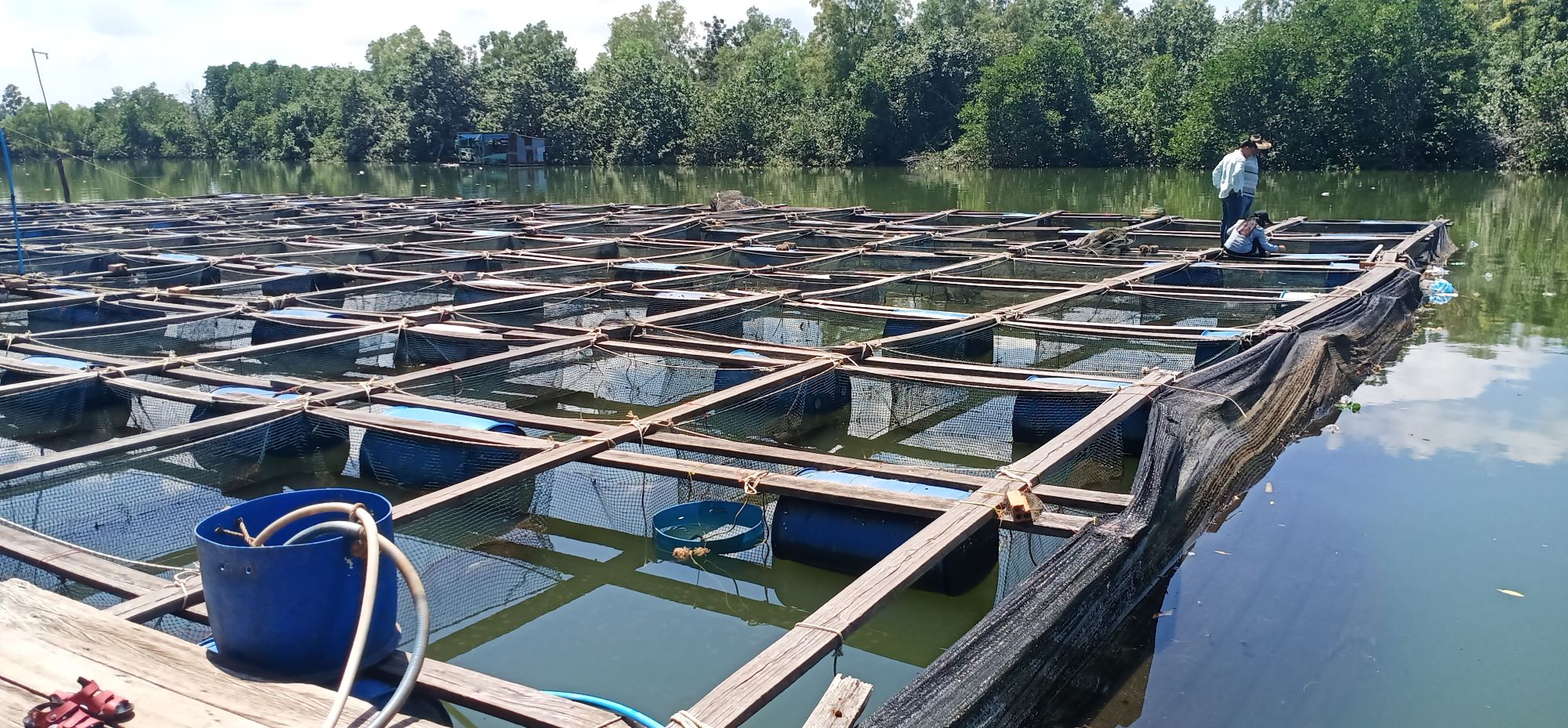Cambodia's emerging marine farming sector, known as mariculture, is gathering momentum with new skills and newfound confidence following a research collaboration involving Cambodia, Indonesia and Australia.
The spark of collaboration
The three-way project was initiated by Cambodian and Indonesian researchers who connected at an Association of Southeast Asian Nations fisheries workshop in Myanmar in 2014.
They were Dr Asda Laining, from the Indonesian Research Institute for Coastal Aquaculture and Fisheries Extension (RICAFE), and Mr Somony Thay, Director of Cambodia's Department of Aquaculture Development.
Through conversations at the workshop, Dr Laining recognised that Indonesian aquaculture staff had expertise that Cambodia needed, much of it developed through ACIAR-supported projects. Mr Thay recognised ACIAR as a potential partner that could help develop Cambodia's mariculture sector.
Dr Mike Rimmer, at the University of the Sunshine Coast, had led many of the ACIAR-supported aquaculture projects in Indonesia. After Dr Laining and Mr Thay separately contacted him about a possible project, it sparked the first ACIAR-supported 'South-South' collaboration, featuring a knowledge exchange between Indonesia and Cambodia, with support from Australia.
Dr Rimmer noted the advantages of Indonesia and Cambodia's cultural and economic alignment as a key element of the collaboration.
'The Indonesians were well placed to understand the resource constraints and the technical challenges that Cambodia was facing and were able to incorporate that into the training they provided. That's one of the advantages of these kinds of South-South collaborations.
'It's a very different system to aquaculture in Australia, which is generally large-scale and relies on advanced technologies,' said Dr Rimmer.
South-South training
The 4-year mariculture project began in 2018, with the first of two groups of Cambodia's Fisheries Administration (FiA) staff visiting Indonesia. Some took part in training and practical research activities related to fingerling production and pest and disease management at the Institute for Mariculture Research and Fisheries Extension in Gondol, Bali.
Others visited RICAFE in Maros, South Sulawesi, focusing on fish feeds and nutrition. Training for a second group planned for 2020 was moved online due to COVID-19 pandemic travel restrictions.
Seventeen FiA staff received training in technical skills from Indonesian experts during the project. Another 12 staff worked with Australian researchers, learning to conduct value chain analysis, with an initial focus on the value chain for Asian seabass (Lates calcarifer) in Cambodia.
A complementary ACIAR-supported project tapped into Australian expertise in tertiary-level adult education at the University of Tasmania. Professor Janelle Allison helped Indonesian staff provide training and develop curricula, ensuring they could deliver effective training to the Cambodians, both in person and online.
As an Indonesian researcher, Dr Laining said the projects encouraged her and her colleagues to improve their capacity as trainers.
'It also gave us an appreciation of our own skills as scientists and being able to share our knowledge with another country, such as Cambodia, which is beginning their learning,' added Dr Laining.
Indonesian researchers have published several scientific papers following the collaboration with Cambodia and Australia, further building their skills and reputation.
Increased mariculture production
The project included a review of operations of Cambodia's Marine Aquaculture Research and Development Centre (MARDeC) in Cambodia. This aimed to improve the centre's research capacity and ensure it could run effectively with Cambodian resources, rather than relying on imported expertise and materials.
Changes implemented as part of the review, along with the improved staff skills, have helped the MARDeC team to more than double the production of Asian seabass fingerlings.
Reliable, locally produced fingerlings supplement those imported from Thailand and Vietnam, which often have high mortality rates due to the long distances they travel.
Smallholder fish farmers and medium-sized mariculture businesses raise Asian seabass in sea cages. The species, also known as barramundi, is one of the country's main mariculture species.
Mr Thay said increased staff capabilities were a lasting outcome from the ACIAR-supported mariculture project.
'Increasing production from aquaculture is a national priority. Building our human resource capacity is an essential part of that,' said Mr Thay.
FiA staff have also gained new skills in pest and disease diagnostics from training with Indonesian counterparts. This has expanded the on-farm technical support services they provide to farmers, and the speed with which they can respond to improve fish husbandry and disease management.
Mr Thay noted that some staff involved in the training have gone on to further education or have become consultants. Their communication and networking skills have improved, and their growing confidence has helped to secure international funding for new projects to support both inland and marine aquaculture.
Expanded research capabilities
Staff at MARDeC have also advanced their research program with a greater understanding of scientific processes. Research to support commercial production has expanded from seabass and hybrid grouper species to black coral oysters, seaweeds, blue mussels and green-lipped mussels. Research for marine restoration programs includes blue swimmer crabs and mud crabs.
ACIAR is evaluating the South-South approach used in the mariculture project, although it has already adopted the strategy for other projects.
For example, an ACIAR-supported project helped to develop landcare-based farming systems in the Philippines, and Filipino researchers are now collaborating with researchers in Fiji to expand their approach.
ACIAR Research Program Manager, Fisheries, Dr Chris Barlow said Australia essentially acts as the facilitator in these projects.
'It supports the exchange of knowledge developed through ACIAR-supported projects with other developing countries in the global South,' explained Dr Barlow.
'These kinds of projects really recognise the long-term legacy of our efforts to build capacity in our partner countries.'
Source - https://www.miragenews.com













